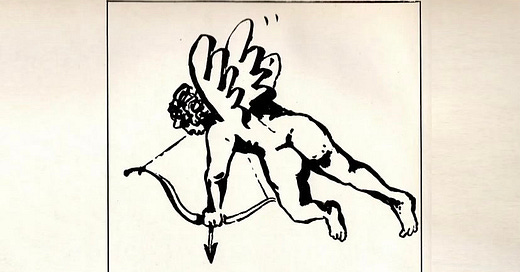This weekend, I tore through Francesco Alberoni’s 1979 book Falling in Love, in which he posits that there is a “very close relationship between the great collective movements of history and falling in love”
He continues:
….the universal language of desire for something that is desired above every other thing, the universal language of liberation and right, the language of the triumphant life that creates a new ethos. What is established in every collective movement, and hence when we are in love, is established in opposition to customary interests and institutions, and to participate in this, to have the “right” to do so, we must enter a new region of values that have the same status as those interests and institutions.
Falling in love challenges institutions on the level of their fundamental values. Its nature lies precisely in this, in not being a desire, a personal whim, but a movement that carries with it a plan for life and creates an institution.
Love is a radical act of imagination, of hope, of possibility. Seeing someone else articulate the undeniable parallels comforts me greatly, which is probably why I could not put this book down.
Falling in love is a dividing of what was united and a uniting of what was divided.
The simplicity of this, the beauty of its truth leaves me in awe.
Alberoni writes about our difficulty leaving the past behind. We are tethered to it, that is until the possibility of a new love emerges and we are thrown, once again, into what he describes as the Nascent State:
The nascent state (of falling in love or of collective movements) has this extraordinary capacity to remake the past.
The nascent state is an attempt to remake the world, starting with this different way of thinking and living; it is an attempt to achieve in the world this experience of absolute solidarity and the end of all alienation and uselessness.
But even in this state, we must find the strength to surmount the weight and pull of the past.
We must be able to face it, we have to admit to our greed and identify our mistakes.
We must be willing to do better.
And I don’t think we’re very good at that.
Even with the best intentions, we repeat the same mistakes and waste another opportunity for newness.
Love is a drive to overcome difference.
Love is an attempt at consensus.
And yet, when we look at the state of Love in the Western hellhole we live in, we can see its destitution; narcissism, situationships, neuroticism, cruelty, ghosting.
Our spinelessness is more obvious than ever.
Carrie Bradshaw (I’m sorry, I’m sorry!) famously asked:
If you love someone, and you break up, where does the love go?
It’s not her worst question.
Lately, I’ve been wondering that too.
Alberoni writes:
Even at a distance of years or decades, lovers who are now separated will not be able to get through certain days without being upset, will not be able to return to certain places without being flooded by nostalgia.
The love goes nowhere.
Every time I walk by.
Nostalgia is a bitch, the obstacle that holds us down.
Nostalgia obscures the nascent state and its infinite imagination.
and we let it; we become fear’s bitch.
Remember? is an easier question than What if?
Realism Confidence is a reader-supported publication. If you’d like to support my writing (or help me go to the dentist), please consider becoming a paid subscriber, buying a subscription for someone else, or, if you like what you’re reading, you can send me a tip via Paypal. Feel free to follow me here or here.
You can order my new book of poetry here.





Where did you find a copy of Falling in Love in English? After reading this I want to know more. Thank you!
Love